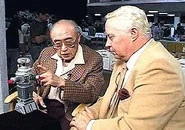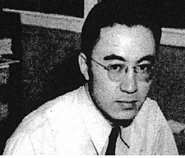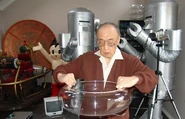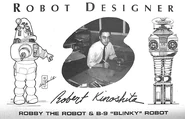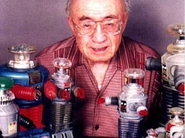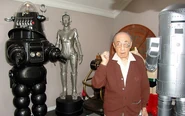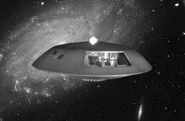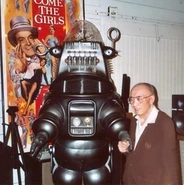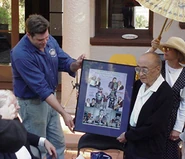Alexander Singer[]
Alexander Singer is a prolific television director who worked from the early 1960's to the late 1990's. He directed episodes of popular series such as The Fugitive, Mission: Impossible, Lou Grant, Star Trek: The Next Generation and Star Trek: Deep Space Nine. Singer directed one episode of Lost in Space, "The Derelict."
Allan Balter[]
Allan Balter was a writer and producer from the 1960's through the 1980's. He is best-known for his work on Mission: Impossible. Balter frequently partnered with William Read Woodfield on writing projects. Together, they wrote two episodes of Lost in Space, "Attack of the Monster Plants" and "Wild Adventure." Balter served as associate producer on the Irwin Allen series Voyage to the Bottom of the Sea and also wrote seven episodes of that series and one episode of The Time Tunnel.
Alvin Ganzer[]
Alvin Ganzer was born in August 1911, in Cold Springs, Minnesota. He started his career in 1947 and he retired in 1978. Ganzer became a famous director and writer and directed many TV serials such as David Cassidy—Man Undercover, The American Girls, Police Woman and Ironside. He is famous for directing and writing The Leather Saint. Ganzer directed one episode of Lost in Space, "Welcome Stranger." He died on January 3, 2009 in Hawaii.
Anton Leader[]
Anton "Tony" Leader was a producer and director of radio programs in the 1940's. In the 1950's he transitioned to television directing. Leader is best-known for his work on westerns like Rawhide and The Virginian but he made forays into most genres, including science fiction with an episode of Star Trek and two episodes of Lost in Space. He directed "Island in the Sky" and "The Reluctant Stowaway."
Barney Slater[]
Barney Slater is best-known as a writer of westerns in the 1950's and 1960's but he also wrote 22 episodes of Lost in Space. He ranks second after Peter Packer for writing the most episodes of the series. Slater also wrote an episode of the Irwin Allen production The Time Tunnel. Slater's 22 episodes of Lost in Space are:
- "The Sky Is Falling"
- "Wish Upon a Star"
- "The Keeper: Part 1"
- "The Keeper: Part 2"
- "War of the Robots"
- "The Challenge"
- "The Space Trader"
- "All That Glitters"
- "Follow the Leader"
- "The Forbidden World"
- "The Prisoners of Space"
- "The Deadly Games of Gamma 6"
- "Curse of Cousin Smith"
- "The Wreck of the Robot"
- "The Golden Man"
- "Rocket to Earth"
- "Trip Through the Robot"
- "The Mechanical Men"
- "The Galaxy Gift"
- "The Anti-Matter Man"
- "The Flaming Planet"
- "Junkyard of Space"
Carey Wilber[]
Carey Wilber was a television writer born in Buffalo, New York on June 26, 1916. His career spanned from the early 1950's to the late 1970's, when he worked on more than fifty different television programs. One of Wilber's most memorable achievements is scripting the episode "Space Seed" of Star Trek, which introduced the villain Khan Noonien Singh. This character would later become the featured antagonist in the 1982 film Star Trek II: The Wrath of Khan. Wilber began his TV writing career in the mid-1950's, and was a member of the Writer’s Guild of America West since 1954.
During the Golden Age of Television, Wilber wrote for Studio One, Kraft Theatre, Gulf Playhouse and Captain Video. Before retiring in 1982, he also wrote over two hundred hours of drama programming. His credits include episodes of The Untouchables, Maverick, Rawhide, Star Trek, Lost in Space, Bonanza, Cannon, Barnaby Jones and Hawaii 5-O. Wilber won the Western Heritage Award in 1961 for his work on an episode of The Outlaws. Carey Wilber's final television work was writing the "Chase Through Time" segment of the 1982 television movie Aliens from Another Planet.
Don Richardson[]
Don Richardson was a prolific television director from the late 1950's through the early 1970's. He directed episodes of Bonanza, Margie, The Defenders, The Virginian, The Munsters and Mission: Impossible, but is best known for being the most prolific director of Lost in Space. Richardson directed 26 episodes:
- "Ghost in Space"
- "The Challenge"
- "The Lost Civilization"
- "Follow the Leader"
- "Wild Adventure"
- "The Forbidden World"
- "The Android Machine"
- "A Visit to Hades"
- "The Dream Monster"
- "The Golden Man"
- "The Questing Beast"
- "Mutiny in Space"
- "Rocket to Earth"
- "Cave of the Wizards"
- "Revolt of the Androids"
- "Trip Through the Robot"
- "The Astral Traveller"
- "Kidnapped in Space"
- "Hunter's Moon"
- "The Space Destructors"
- "Collision of the Planets"
- "Deadliest of the Species"
- "Two Weeks in Space"
- "Princess of Space"
- "The Flaming Planet"
- "The Great Vegetable Rebellion"
Ezra Stone[]
Ezra Stone was a television director from the 1940's through the 1970's. He is most famous for his association with The Munsters. He directed 27 episodes of The Munsters and appeared as Dr. Lichtlighter in The Munsters Revenge television movie in 1981. Stone directed the following eight episodes of Lost in Space:
- "The Space Vikings"
- "The Colonists"
- "The Phantom Family"
- "The Galaxy Gift"
- "The Time Merchant"
- "The Promised Planet"
- "Fugitives in Space"
- "Junkyard of Space"
Harry Harris[]
Harry Harris (September 8, 1922 - March 19, 2009) was an American television and film director. Harris moved to Los Angeles in 1937 and got a mailroom job at Columbia Studios. After attending UCLA, he became an apprentice sound cutter, assistant sound effects editor, and then an assistant film editor at Columbia Pictures. During the Second World War he part of the First Motion Picture Unit in service to the United States Army Air Force. At the end of World War II, Harris became an assistant film editor and then an editor for Desilu, the studio of Desi Arnaz and Lucille Ball. Over the next five decades, he directed hundreds of TV episodes, with significant contributions to Gunsmoke, Eight is Enough, The Waltons, and Falcon Crest.
Herman Groves[]
Herman Groves was a prolific television writer who worked from the 1950's to the 1980's. He is probably best-known for writing 18 episodes of Disneyland. Groves wrote one episode of Lost in Space, "The Sky is Falling."
Jackson Gillis[]
Jackson Gillis was a prolific television writer from the 1950's into the 1990's. He was an intelligence officer serving in the Pacific during WWII. Following the war, he became a writer for radio programs and then transitioned into television. Gillis is probably best-known for his work as a writer and associate producer on Perry Mason but he also wrote for the popular drama Columbo. He was nominated for an Emmy Award in 1972 for his work on Columbo. Gillis wrote 15 episodes of Adventures of Superman. Gillis worked on several Irwin Allen projects. He wrote an episode of Land of the Giants and seven episodes of Lost in Space. In the late 1960s, Gillis co-wrote (with William Welch) an un-produced pilot script called "No Way Out" for Allen's proposed television series based on Journey to the Centre of the Earth. Gillis wrote seven episodes of Lost in Space:
- "My Friend, Mr. Nobody"
- "The Magic Mirror"
- "The Thief from Outer Space"
- "The Haunted Lighthouse"
- "A Day at the Zoo"
- "Princess of Space"
- "Space Beauty"
Justus Addiss[]
Justus Addiss directed two episodes of Lost in Space, "Attack of the Monster Plants" and "Curse of Cousin Smith." He also worked as a director on 16 episodes of Irwin Allen's Voyage to the Bottom of the Sea.
Leonard Horn[]
Leonard Horn was a television director in the 1960's and 1970's. He directed the Lost in Space episode "Invaders from the Fifth Dimension." He also directed nine episodes of the Irwin Allen production Voyage to the Bottom of the Sea.
Michael Fessier[]
Michael Fessier, a movie and television scriptwriter as well as an author of short stories, was born November 6, 1905, in Angels Camp, California. Hedied in September 1988 in Northridge, California. He was 82 years old. Fessier, editor of the San Rafael (Calif.) Independent Journal in the early 1930's, wrote the scripts for such movies as You'll Never Get Rich, You Were Never Lovelier, It All Came True, Wings Over the Navy and Angels Wash Their Faces. For many scripts he was part of a team with Ernie Pagano. Fessier also wrote for many television shows such as Bonanza, Alfred Hitchcock Presents and The Thin Man. He wrote one episode “West of Mars” for Lost in Space. He retired as a screenwriter in 1973.
Nathan Juran[]
Nathan Juran began his career as an architect before moving into the film business as an art director. He won an Oscar for his art direction on How Green Was My Valley. During WWII he served with the Office of Strategic Services (OSS) and returned to Hollywood in the 1950s to become a director. He directed sci-fi classics like 20 Million Miles to Earth and Attack of the 50 Foot Woman but is probably best-known for helming the Ray Harryhausen fantasy extravaganza, The 7th Voyage of Sinbad. He went on to become a prolific director on Irwin Allen-produced TV series, including Voyage to the Bottom of the Sea, The Time Tunnel, Land of the Giants and, of course, Lost in Space. After Don Richardson and Sobey Martin, Juran directed the most episodes of the series with 13.
Juran directed:
- "Return from Outer Space"
- "The Magic Mirror"
- "The Space Trader"
- "Blast Off Into Space"
- "The Ghost Planet"
- "The Prisoners of Space"
- "The Deadly Games of Gamma 6"
- "West of Mars"
- "The Wreck of the Robot"
- "The Girl from the Green Dimension"
- "Condemned of Space"
- "The Space Primevals"
- "Target Earth"
Norman Lessing[]
Norman Lessing was a television director who worked from the 1950's through the 1970's. He was also well-known as a chess master and he co-wrote a book called The World of Chess in 1974. Lessing wrote extensively for television in New York from its pioneering days in 1950, and moved to California to continue his career until 1979. Shows for which he wrote screenplays include Hawaii Five-O, The Fugitive, the Lost in Space episode "Island in the Sky," Bonanza, The Nurses, The FBI, Baretta, Cannon, Dragnet, Eight is Enough, Shirley Temple's Storybook, The Adventures of Ellery Queen, and The Man from U.N.C.L.E.. He also wrote the play 36, which was performed all over the United States.
Paul Stanley[]
Paul Stanley was a prolific television director who worked from the 1950's through the 1980's. He directed the Lost in Space episode "My Friend, Mr. Nobody." He also directed an episode of the Irwin Allen production The Time Tunnel. Stanley's credits encompass all genres, extending to more than fifty prime time television series of the period, from Have Gun–Will Travel in 1957 to MacGyver in 1985. His feature film credits include:
- Cry Tough (1959)
- Mission Impossible Versus the Mob (1968) (based on the TV series Mission: Impossible)
- Three Guns for Texas (1968) — one segment (re-edited from the TV series Laredo)
- Cotter (1973)
- Moby Dick (1978)
Peter Packer[]
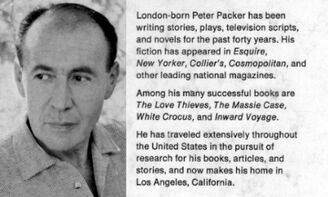
Peter Packer holds the record for writing the most episodes of Lost in Space. His episodes frequently include Western themes. Packer created the Western series Man Without a Gun and wrote several episodes of Bonanza and The Big Valley. Packer also wrote episodes for the Irwin Allen produced series Land of the Giants and Voyage to the Bottom of the Sea. Packer wrote the following 25 episodes of Lost in Space:
- "The Derelict"
- "Welcome Stranger"
- "The Oasis"
- "The Raft"
- "Return from Outer Space"
- "Ghost in Space"
- "The Space Croppers"
- "A Change of Space"
- "Blast Off Into Space"
- "The Ghost Planet"
- "The Dream Monster"
- "The Girl from the Green Dimension"
- "Mutiny in Space"
- "Cave of the Wizards"
- "The Colonists"
- "The Phantom Family"
- "Condemned of Space"
- "Visit to a Hostile Planet"
- "The Space Primevals"
- "Flight Into the Future"
- "Collision of the Planets"
- "Castles in Space"
- "Target: Earth"
- "The Promised Planet"
- "The Great Vegetable Rebellion"
Little is known about the private life of Packer but it would seem he was partly interested in making Lost In Space a space western rather than a science fiction series. Almost right from the word go Packer introduced guest characters who seemed like they had just walked out of a farm rather than another galaxy (note episodes: "Welcome Stranger," "Return From Outer Space," "The Space Croppers," "Blast Off Into Space" and "A Visit To A Hostile Planet"). Packer seemed to have little knowledge of science, which was obvious from his very first Lost In Space episode: "The Derelict." Peter Packer scripted wonderful season openers ("Blast Off Into Space," "Condemned Of Space") that put spaceship Jupiter 2 on center stage and were so good that viewers kept coming back for more. Packer is also the writer responsible for "The Great Vegetable Rebellion", of which he reportedly apologized to Jonathan Harris, telling him he literally had run out of ideas by this point.
Robert Hamner[]
Robert Hamner wrote 6 episodes of Lost in Space. He also wrote for the Irwin Allen production The Time Tunnel and Voyage to the Bottom of the Sea. He is probably best-known as the creator of S.W.A.T. but he had a lengthy career as a writer for television and film including a writing credit on Star Trek. He won the Peabody Award for his work on the TV movie When Hell was in Session. Hamner wrote the following 6 Lost in Space episodes:
- "Kidnapped in Space"
- "The Space Destructors"
- "Deadliest of the Species"
- "Two Weeks in Space"
- "The Anti-Matter Man"
- "Fugitives in Space"
Robert Kinoshita[]
Robert Kinoshita He was born February 24, 1914. He died on December 7, 2014, at 100-years-old of age. He was an artist, art director, and set and production designer who worked in the American film and television industries from the 1950s through the early 1980s. Around April 1965, Irwin Allen hired Robert Kinoshita as the art director for the Lost in Space series. Of the many tasks to befall Kinoshita, two of them were to come up with a robot (which he nicknamed "Blinky") and to redesign the pilot film's Gemini XII space ship into what would become the Jupiter 2. This robot never had a real name—only the model number "B9." In the show he was referred to as "the Robot" or called by the generic name, "Robot." He was brought to life by the combination of actor Bob May and voice actor Dick Tufeld. Two of Kinoshita's famous robots appeared faceplate-to-faceplate in the Lost in Space episodes "War of the Robots" and "Condemned of Space", where Robby the Robot appeared as a guest robotoid and robot, respectively. Among his credits are art direction on four other well-known TV shows: Highway Patrol (1955–1959), Bat Masterson (1960–1961), Hawaii Five-O (1970–1971), and Kojak (1973–1974).
Shimon Wincelberg[]
Shimon Wincelberg was a German-born television writer who worked from the 1950s through the 1990s. Under the name S. Bar-David he wrote two episodes of Star Trek. Wincelberg also wrote episodes of Planet of the Apes, Have Gun - Will Travel and the Irwin Allen production The Time Tunnel and Voyage to the Bottom of the Sea. Wincelberg wrote nearly 100 scripts for television series, including Naked City, Mannix, Police Woman, Star Trek, Gunsmoke, Have Gun—Will Travel, Lost in Space, and, more recently, Law & Order. He also wrote the 1959 Broadway play "Kataki," which was inspired by his World War II service in the Army's 27th Division, Combat Intelligence. His 1962 play "Windows of Heaven" made its world premiere at Stockholm's Royal Dramatic Theater. Wincelberg wrote the following seven episodes of Lost in Space:
- "No Place to Hide"
- "The Reluctant Stowaway"
- "The Derelict"
- "Island in the Sky"
- "There Were Giants in the Earth"
- "The Hungry Sea"
- "Invaders from the Fifth Dimension"
Sobey Martin[]
Sobey Martin was a prolific director of Irwin Allen productions in the 1960's. After Don Richardson, he directed the most episodes of Lost in Space. He also directed many episodes of Voyage to the Bottom of the Sea, The Time Tunnel and Land of the Giants. Sobey Martin had a reputation for shouting "Action!" and then falling asleep in his director's chair. He was born on June 27, 1909 in Germany. He died on July 27, 1978 (age 69) in Los Angeles, California. Martin directed 14 episodes of Lost in Space:
- "The Hungry Sea"
- "The Sky Is Falling"
- "The Raft"
- "The Keeper: Part 1"
- "The Sky Pirate"
- "War of the Robots"
- "The Space Croppers"
- "A Change of Space"
- "The Thief from Outer Space"
- "Visit to a Hostile Planet"
- "The Haunted Lighthouse"
- "Flight Into the Future"
- "The Space Creature"
- "Castles in Space"
William Read Woodfield[]
William Read Woodfield was a writer and producer from the 1950's through the 1990's. He is best known for his work on Mission: Impossible. He frequently partnered with Allan Balter on writing projects. Together, they wrote two episodes of Lost in Space: "Attack of the Monster Plants" and "Wild Adventure." Woodfield also wrote 14 episodes of the Irwin Allen series Voyage to the Bottom of the Sea and one episode of The Time Tunnel.
Sutton Roley[]
Sutton Roley was a television director who worked from the 1950's until 1990. He directed four episodes of Lost in Space and also directed three episodes of the Irwin Allen production Voyage to the Bottom of the Sea. Roley directed the following episodes of Lost in Space:
William Welch[]
William Welch was a frequent writer on Irwin Allen productions. He wrote four episodes of Lost in Space, eight episodes of The Time Tunnel, 34 episodes of Voyage to the Bottom of the Sea and 10 episodes of Land of the Giants. Welch wrote the following four Lost in Space episodes:

